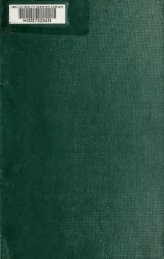The Health bulletin [serial] - University of North Carolina at Chapel Hill
The Health bulletin [serial] - University of North Carolina at Chapel Hill
The Health bulletin [serial] - University of North Carolina at Chapel Hill
Create successful ePaper yourself
Turn your PDF publications into a flip-book with our unique Google optimized e-Paper software.
August. 1927 <strong>The</strong> <strong>Health</strong> Bulletin 25<br />
PURIFICATION OF SPRINGS AND WELLS<br />
P For nearly three-fourths <strong>of</strong> a cen- running down the ditch or trench to<br />
tury the question <strong>of</strong> how w<strong>at</strong>er is a lower level.<br />
purified underground, and thus re-<br />
<strong>The</strong> experiments reported by the<br />
mains fresh and safe and potable,<br />
p^^lic <strong>Health</strong> Service concerning the<br />
has been a m<strong>at</strong>ter <strong>of</strong> controversy m<br />
purific<strong>at</strong>ion <strong>of</strong> w<strong>at</strong>er are <strong>of</strong> intense<br />
which the views <strong>of</strong> public health<br />
interest. To quote the<br />
authorities and<br />
language <strong>of</strong> a<br />
sanitarians throughout<br />
the country<br />
writer in the<br />
have been<br />
United<br />
divided.<br />
St<strong>at</strong>es Daily:<br />
<strong>The</strong> United St<strong>at</strong>es Public <strong>Health</strong><br />
"<strong>The</strong>se investig<strong>at</strong>ions have uncovered<br />
Service has recently issued a report, a hitherto unknown law <strong>of</strong> n<strong>at</strong>ure,<br />
known as Hygienic Labor<strong>at</strong>ory Bulletin<br />
No. 147, dealing with the question <strong>of</strong> the ground w<strong>at</strong>er, due to rain<br />
namely, th<strong>at</strong> it is the rise and fall<br />
and<br />
<strong>of</strong> the pollution <strong>of</strong> wells by means <strong>of</strong> drought, which permits the w<strong>at</strong>er to<br />
the w<strong>at</strong>er under ground. Sometime become purified; were it not for this<br />
follovving the close <strong>of</strong> the World War fact, the underground w<strong>at</strong>er would<br />
a special board was named to study contain pollution <strong>of</strong> considerable age,<br />
the subject and to experiment ex- possibly d<strong>at</strong>ing back many years, and<br />
tensively in an endeavor to find out it would be difficult to find pure<br />
how the underground w<strong>at</strong>er becomes spring w<strong>at</strong>er or pure well w<strong>at</strong>er expurified<br />
n<strong>at</strong>urally, and also how far cept under an impervious layer."<br />
specific bacterial pollution, as well as Such findings <strong>of</strong> the investig<strong>at</strong>ors,<br />
chemical pollution, might perme<strong>at</strong>e and such conclusions as those reached<br />
underground soil. A part <strong>of</strong> these by the editor <strong>of</strong> the N<strong>at</strong>ional Daily,<br />
experiments th<strong>at</strong> rel<strong>at</strong>e to the dis- are based on common sense. People<br />
tance <strong>at</strong> which chemical or bacterial complain <strong>of</strong> drought damages done<br />
pollution might travel was carried on the crops; farmers fail in their<br />
under the direction <strong>of</strong> Pr<strong>of</strong>essor Stiles efforts; and all <strong>of</strong> us complain. But<br />
near Southport, <strong>North</strong> <strong>Carolina</strong>, and such an occurrence in a land like<br />
also <strong>at</strong> the old Marine Hospital <strong>at</strong> ours lowers the w<strong>at</strong>er level and there-<br />
Wilmington, N. C. fore causes polluted soil to dry out<br />
<strong>The</strong> reports <strong>of</strong> Pr<strong>of</strong>essor Stiles' and the germs to die, and then in<br />
experiment, which were published by subsequent years or seasons <strong>of</strong> rainy<br />
the Public <strong>Health</strong> Service sometime we<strong>at</strong>her when the w<strong>at</strong>er line rises, a<br />
back, indic<strong>at</strong>e th<strong>at</strong> they were able to supply <strong>of</strong> pure w<strong>at</strong>er becomes availrecover<br />
chemical pollution in wells<br />
up to a distance <strong>of</strong> 450 feet, and bacterial<br />
pollution up to a distance <strong>of</strong><br />
232 feet from the ditches or trenches<br />
able for months and months afterward.<br />
<strong>The</strong>se scientific conclusions bring<br />
to mind the thought expressed by a<br />
in the ground in which the pollution poet long ago:<br />
was placed. This means, <strong>of</strong> course, "<strong>The</strong> waves th<strong>at</strong> moan along the<br />
th<strong>at</strong> the pollution perme<strong>at</strong>ed across shore,<br />
l<strong>at</strong>erally under the surface through .<br />
^''^ winds th<strong>at</strong> sigh in blowing,<br />
the dirt proper, and not by simply Which men are wise in Mowing:'<br />
ADVANCING INTEREST IN PEDIATRICS<br />
We are publishing elsewhere in this<br />
issue an article, accompanied by photographic<br />
illustr<strong>at</strong>ion, <strong>of</strong> the hospital<br />
work carried on <strong>at</strong> Saluda, <strong>North</strong><br />
<strong>Carolina</strong>, for the benefit <strong>of</strong> sick babies<br />
Along with the organiz<strong>at</strong>ion and<br />
start <strong>of</strong> the Baby's Hospital work<br />
there, chiefly under the leadership <strong>of</strong><br />
in <strong>North</strong> and South <strong>Carolina</strong> especially.<br />
Dr. D. L. Smith, a pedi<strong>at</strong>rician <strong>of</strong><br />
Spartanburg, South Carolin|i, and Dr.<br />
Frank Howard Richardson^ a pedi<strong>at</strong>rician<br />
<strong>of</strong> Brooklyn, New Vork, and


![The Health bulletin [serial] - University of North Carolina at Chapel Hill](https://img.yumpu.com/33495252/255/500x640/the-health-bulletin-serial-university-of-north-carolina-at-chapel-hill.jpg)
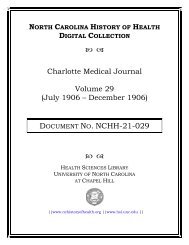
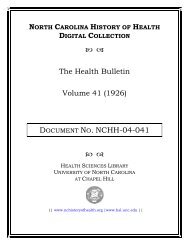
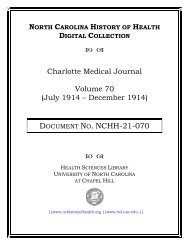
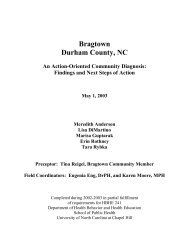
![Bulletin of the North Carolina Board of Health [serial] - University of ...](https://img.yumpu.com/48032016/1/153x260/bulletin-of-the-north-carolina-board-of-health-serial-university-of-.jpg?quality=85)
![The Health bulletin [serial] - University of North Carolina at Chapel Hill](https://img.yumpu.com/47603625/1/169x260/the-health-bulletin-serial-university-of-north-carolina-at-chapel-hill.jpg?quality=85)
![The Health bulletin [serial] - University of North Carolina at Chapel Hill](https://img.yumpu.com/47242858/1/169x260/the-health-bulletin-serial-university-of-north-carolina-at-chapel-hill.jpg?quality=85)
![The Health bulletin [serial] - University of North Carolina at Chapel Hill](https://img.yumpu.com/43204263/1/172x260/the-health-bulletin-serial-university-of-north-carolina-at-chapel-hill.jpg?quality=85)
![The Health bulletin [serial] - University of North Carolina at Chapel Hill](https://img.yumpu.com/41981074/1/163x260/the-health-bulletin-serial-university-of-north-carolina-at-chapel-hill.jpg?quality=85)
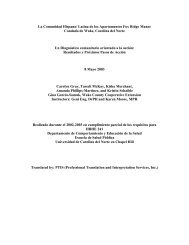
![The Health bulletin [serial] - University of North Carolina at Chapel Hill](https://img.yumpu.com/40912928/1/164x260/the-health-bulletin-serial-university-of-north-carolina-at-chapel-hill.jpg?quality=85)
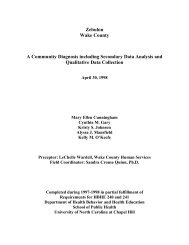
![The Health bulletin [serial] - University of North Carolina at Chapel Hill](https://img.yumpu.com/35643061/1/167x260/the-health-bulletin-serial-university-of-north-carolina-at-chapel-hill.jpg?quality=85)
![Biennial report of the North Carolina State Board of Health [serial]](https://img.yumpu.com/34024350/1/166x260/biennial-report-of-the-north-carolina-state-board-of-health-serial.jpg?quality=85)
